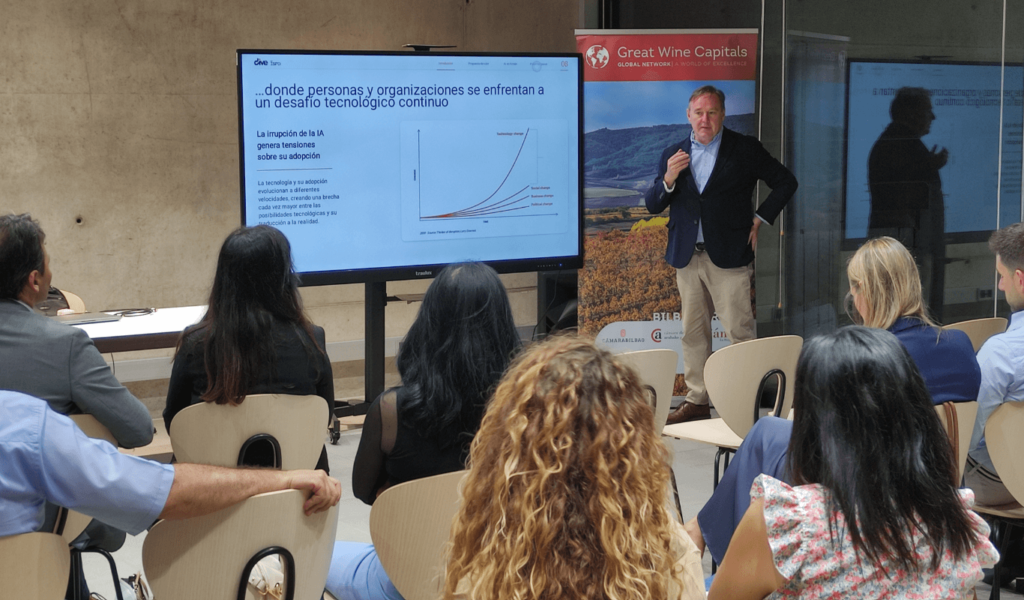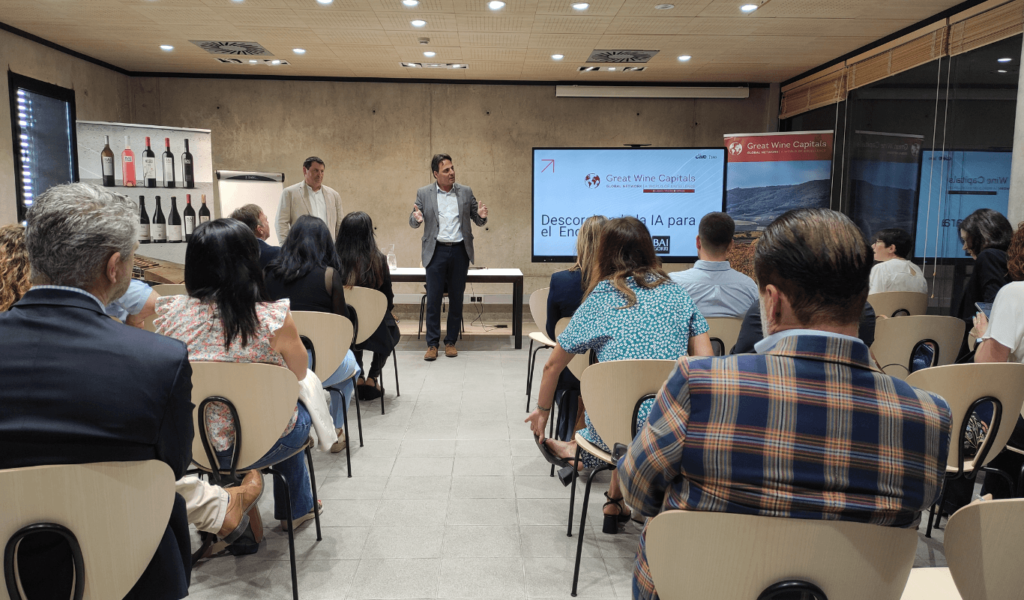The Best Of Club, an initiative of the Bilbao-Rioja Committee in the Great Wine Capitals Global Network (GWC), gathered Wine Tourism managers from BOWT award-winning companies at Bodegas Baigorri (Samaniego, Álava, Spain). These companies offer the best wine tourism services in Álava, Bizkaia, and La Rioja.
The Best Of Club Bilbao-Rioja meeting took place at Bodegas Baigorri, winner of the Best Of Wine Tourism Award for Architecture. Its glass cube is an icon of sustainable design in Rioja and the world. The facilities, overlooking a vast sea of vineyards, are an international benchmark for their integration of architecture into the winemaking process and the landscape.
The Best Of Club Bilbao-Rioja was introduced by Santiago Barrueco, General Director of the Chamber of Commerce, Industry, and Services of Álava and representative of this institution in the GWC Bilbao-Rioja Committee. Simón Arina, Technical Director and Oenologist of Bodegas Baigorri, welcomed the attending professionals and emphasized the importance of embracing artificial intelligence (AI) as a work tool. He highlighted the value of generating customer data through personalized experiences to predict behavior and enhance decision-making in the business. Arina stressed that wineries must adapt to meet the evolving needs of society.
The main presentation was delivered by Juan Pedro Churruca, COO of Dive.Tech. The AI specialist highlighted the current era of change and transformation, where individuals and organizations face continuous technological challenges. He emphasized the growing gap between technological possibilities and their real-world implementation.

Juan Pedro Churruca, COO of Dive.Tech.
Churruca explained that AI is already transforming the industry and is expected to redefine how we work, accelerating the opportunity for reinvention. AI offers numerous use cases for businesses, including those in wine tourism, to create value in customer behavior analysis, projections, chatbots, and hyper-personalization of experiences.
Wine tourism offers experiences that can be better designed by generative AI. However, Churruca cautioned that AI systems require proper training to function effectively. This training and continuous retraining necessitates data scientists and the creation of new, higher-quality jobs, considering that 40-60% of current jobs will be impacted by AI.
New AI solutions and wine tourism hyper-personalization
Wineries and other wine tourism companies can benefit from a wide range of AI solutions, such as content creation, digital twins, conversational travel planning, and generation of multilingual avatars as virtual assistants for support, customer service, and itinerary selection.
In addition to content creation for websites and social media, AI in wine tourism can be used for product documentation, creating personalized wine descriptions, pairing suggestions, and visits related to the wines, vineyard landscape, and wine culture.
AI can generate personalized labels and educational materials for sommeliers, wine tourism guides, and wine enthusiasts, facilitating learning about tasting, pairing, and winemaking processes. Wineries can develop targeted advertising campaigns and create more compelling brand stories aligned with their history, vision, and customer interests.
AI enables the creation of personalized itineraries for visitors based on their preferences and previous experiences, providing a unique and memorable wine tourism experience.
Churruca explained how hyper-personalization works in wine tourism, using the example of a virtual assistant that learns from user interactions through a mobile app, gradually understanding their preferences to offer increasingly tailored recommendations.
Another notable application is the creation of multilingual avatars for conversational assistance to tourists during their stay, in any language. These avatars can provide information, generate itineraries, offer weather forecasts, or replan daily activities on the pre-selected wine tourism route.
Digital twins can facilitate virtual tours of each winery, accommodation, or vineyard, with recommendations tailored to individual tastes and expectations. Additionally, the combination of AI and gamification opens possibilities for creating wine tasting trainers, helping users improve their knowledge and technique while encouraging enjoyment of the wines and the region where they are produced.

Simón Arina and Santiago Barrueco.
Text and photos by Liz Aldayturriaga.